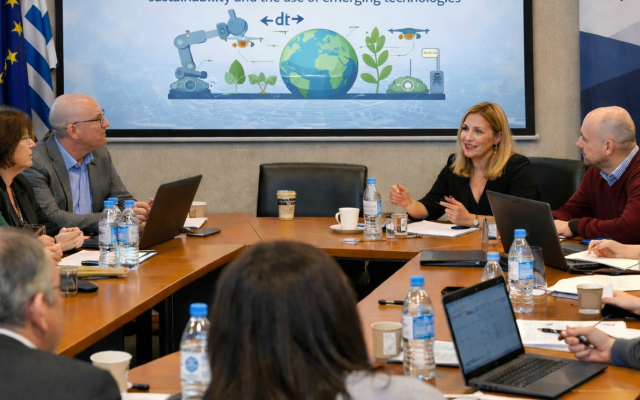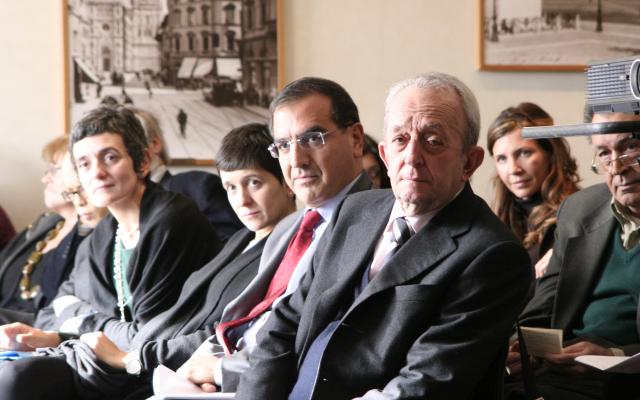Digital citizenship to protect women: necessary training
More than a thousand citizens and employees of the Ministry of Justice followed the event entitled ‘Digital violence against women, how to recognise it and defend yourself’ on the Teams platform, which took place yesterday in the ‘Unità d'Italia’ room of the Court of Appeal of Rome.
The event, organised by the Fondazione Mondo Digitale together with the Directorate-General for Personnel and Training of the Department of Judicial Organisation, Personnel and Services of the Ministry of Justice, had a particular symbolic value: yesterday was the International Day for the Elimination of Violence against Women worldwide, and what is more, Parliament is unanimously approving the introduction of the crime of femicide and the concept of consent in the case of sexual violence. The meeting is part of the Vivi Internet, al meglio (Live the Internet to the fullest) project, with the support of Google.org
Third sector organisations, institutions and civil society groups enriched the discussion on good practices and tools for preventing digital gender-based violence, moderated by Rainews.it journalist Maria Vittoria Savini.
In his opening remarks, the President of the Court of Appeal, Giuseppe Meliadò, recalled that the phenomenon of gender-based violence is so complex that it requires action by a wide range of institutions to combat a reified view of the person, and of women in particular. ‘Today, for the first time, we are together in such a well-attended event that also addresses an audience of men. It is a great sign of attention to the female component, which is numerous in our organisation. Thanks to the Fondazione Mondo Digitale because, with these training opportunities, it gives us the tools to truly implement the right to knowledge about digital violence,’ commented Rosa Patrizia Sinisi, Department of Judicial Organisation, Personnel and Services. " There are many forms of violence today: physical, digital, but also indirect, suffered by the children of violent men.‘
Antonella Ciriello, head of the Department of Technological Innovation in Justice, noted how technology often becomes a tool of oppression: ’As a magistrate of the Court of Cassation, I can say that the current orientation of the justice system is to consider the damage caused by digital violence to be irreversible. This is damage to the psyche which, unlike physical damage, often does not heal completely. Artificial intelligence increases the risks of online violence, but it can also be a tool for protection against deep fakes and altered images."
The work of the Observatory on Gender-Based and Domestic Violence was the focus of the speech by Maria Rosaria Covelli. The President explained how the number of reports underestimates the phenomenon because too many women lack awareness or feel ashamed to report cases. "The Observatory has worked hard, producing, for example, a unique collection of all regulations, of any type, on violence against women. We are entering into an agreement with CRUI to disseminate it in universities. In addition, there is an entire section on the Observatory's website dedicated to digital technology,‘ she concluded.
’Today, as Fondazione Mondo Digitale, we reaffirm our commitment to education in this area, which we approach in two ways. Firstly, by promoting digital citizenship education programmes through teachers, and secondly, by helping parents to move away from a culture of prohibition in favour of education on digital wellbeing,‘ said Mirta Michilli.
Speaking remotely, Alessia Scarpellini, Social Impact and ESG, Google, explained how the issue of child/family safety is addressed within her organisation's ’Stronger Communities" initiative. Scarpellini described “Vivi Internet, al meglio” (Live the Internet to the fullest), a training programme to help young people and adults use the web and technology responsibly, learn the principles of digital citizenship and online safety, support the conscious use of artificial intelligence in Italian schools, and promote inclusion with tools dedicated to students with special needs.
Barbara Strappato, State Police, Director of the First Division of the Postal and Cyber Security Police Service, spoke about real cases to explain what tools are available today to defend against these new forms of violence. ‘We must combat all behaviour that constitutes a crime, and for young people, identify those acts of control that are genuine abuses of power,’ she concluded. Gabriella Covino, Partner at Gianni & Origoni, spoke about the Uguale per tutte (Equal for All) project and the importance of networking in the world of economics, business, institutions, banks and non-profit organisations, with the aim of developing the necessary tools to combat the phenomenon. "In our opinion, information, prevention and education are fundamental because the response to gender-based violence is above all cultural. Therefore, one of the main activities we have carried out since the project's inception has been in schools, together with the State and Postal Police and the Fondazione Mondo Digitale."
The stimulating training session led by psychologist Claudia Campisi focused on the prevention of gender-based violence on the web, through the common dynamics of some specific cases for the development of the psychological profile of victims.
The story is by Onelia Onorati, press office of the Fondazione Mondo Digitale. 





